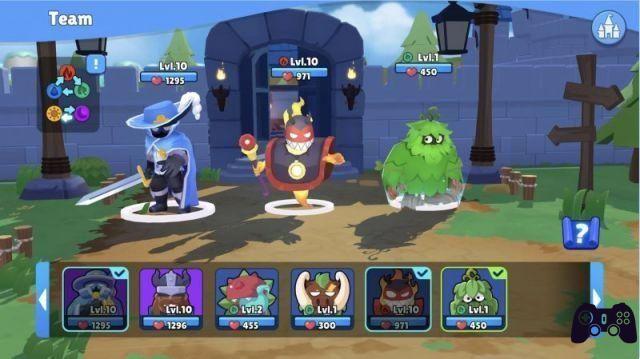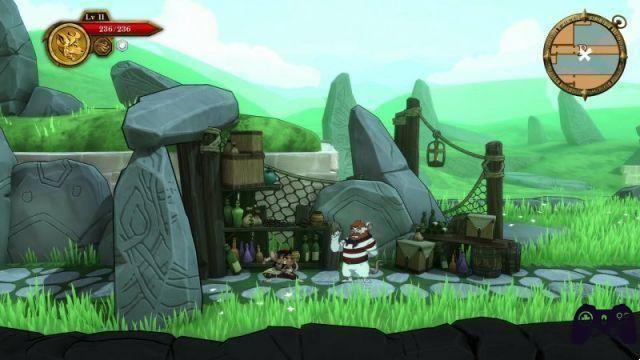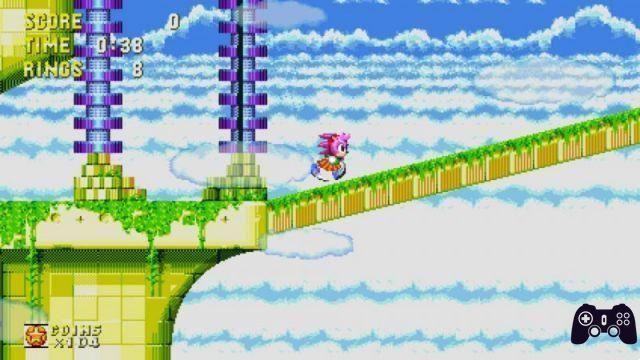In the mobile sector, we have been witnessing for years a process of simplification of game mechanics that, after an initial period of shock for more traditional users, is beginning to show some interesting applications. The automation of controls, in particular, is an area that lends itself to productive interpretations: having overcome the embarrassment of true autoplay, which has now become part of the mobile RPG genre as an almost necessary element, some developers have started to play the concept by proposing concrete innovations in terms of gameplay. A now famous example is provided by Vampire Survivors, but another exponent (albeit less daring than that seen in Poncle's game) can be found in this Summon Mission Review.
In the game we play a fighter armed with throwing knives who must clean several dungeons from the presence of hostile creatures, until we reach the bosses and move on to the next level. All this happens through a structure that could be defined as a hybrid between action RPG and twin-stick shooter, if it were not for the fact that it is played with a single "stick": the peculiar characteristic of Summon Quest is, in fact, the fact of having to only manage the movement of the character within the scenario and the activation of evocations and special techniques, while the fire is automatic, with a constant throwing of swords towards the closest enemy.
While this may seem like an oversimplification, it actually introduces a fundamentally different mechanic, focusing on correct placement and timing when using summons. The general concept is therefore similar to that of Vampire Survivors, but its application finds a closer reference in Archero, a game that has achieved considerable success in the mobile sector.
Everything is represented with great care, as befits a title chosen to be part of the catalogue. Apple Arcade. The team The label has put some care into the creation of the game, through a balanced production on an aesthetic level, although the characterization does not contribute to building a strong identity for a game that is no longer very charismatic.
Automatic knife thrower

Il game It is structured according to a classic progressive mechanic of this type of game: each "dungeon", so to speak, is made up of a series of levels arranged one after another of increasing difficulty, culminating in a confrontation with a boss, preceded by another mini - boss located halfway along the path. In a similar way to what is seen in several roguelikes, we are periodically asked to choose a power-up among three proposals, which then accumulate, constituting constant improvements within the dungeon itself, restarting once the mission is finished. The system works well to modify the protagonist's time structure, but in the end there is very little variation on the theme, considering that you are still limited to throwing knives with some possible passive and active support abilities.
Il control system It is based on a virtual stick placed at the bottom left and a series of keys that correspond to the activation of the different invocations on the right, each characterized by various recovery times. The solution works very well, taking into account the convenience of automatic shooting that allows us to focus solely on moving the protagonist.

The other characteristic element of the game is the constant character progression, which levels up by increasing its statistics. By completing the levels, you also obtain keys to open treasures and coins with which to obtain and buy new equipment and characters to summon, essential in the most challenging battles as valid momentary supports. It is clear that this mechanism was designed for a free-to-play approach with microtransactions, but since Summon Quest was distributed on Apple Arcade, it is now completely devoid of these elements. This is certainly nice, although it is almost strange to find yourself faced with a gacha-like system without any "game" elements or in-app purchases.
Conclusions
Tested version iPad 1.1.2 digital delivery App Store Holygamerz.com 6.5 Readers (1) 7.6 your voteSemi-automated gameplay works very well when it is studied and integrated into a structure that accommodates it perfectly and Summon Quest is further confirmation of this idea. Fundamentally, The Label's game does not offer major innovations compared to what Archero and its derivatives already did a few years ago, but it also adds some elements of constant progression to the basic mechanics that always work quite well to keep interest alive. This at least while it lasts, given that the longevity is not very great and it does not have time to introduce particularly interesting variables during its course, but the promise of more content on the way could still lead to a notable revaluation of the game in the future. near future.
PRO
- Instantly fun and intuitive gameplay.
- Excellent integration of "automatic fire" into the game structure.
- Protagonist progression unleashed by microtransactions
AGAINST
- Repetitive in the long run, with few variations on the theme.
- Not very durable, at least for the moment.
- The semi-gacha structure but without microtransactions creates a strange mix






